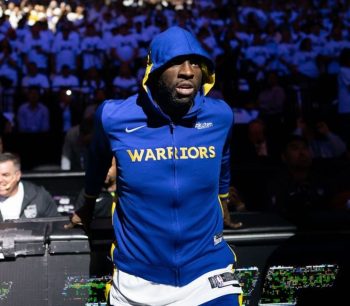NBA
NBA Daily: The Continued Growth of Zach LaVine

Zach LaVine was the 13th pick in the 2014 NBA draft, entering the league as an uber-athletic prospect with a raw game. He’s improved every year he’s been in the NBA, and now, in his seventh season, he’s playing at a level that might make him an All-Star.
Through the Chicago Bulls’ first 17 games of the season, LaVine’s averaging 27 points per game, the eighth-most in the NBA. He’s taking fewer two’s and slightly more three’s, increasing his volume of attempts from beyond the arc from 8.1 to 8.6, knocking them down at a 39.7 percent clip. Last season, he shot 38 percent from three-point range.
LaVine’s taking 18.5 shots per game and making 50.2 percent of them. He’s at his best attacking off the dribble, and he’s gone from taking 7.5 pull-up jumpers per game to 8.1. Despite the increase in volume, he’s making those shots with greater efficiency, going from a 35-percent shooter on pull-ups last season to converting 42 percent of those attempts this season.
Most of LaVine’s shots are above the break three-pointers or occurring in the restricted area and, while the former is considered the least efficient deep-range look, LaVine’s taken 116 such attempts this season and converted them at a 39.7 percent clip. He’s also performed better at the free-throw line, as he’s converted 87.6 percent of his attempts on the season compared to just 80.2 percent last season. Both stats have significantly boosted LaVine’s effective field goal percentage this season (59.4 percent) and led to a career-best true shooting percentage (64.2).
Those personal improvements have certainly provided a boost to the Bulls’ offense, but LaVine’s growth as a facilitator has supercharged it. Last season, Chicago managed a paltry 106.8 points per game. But, with a further improved LaVine leading the charge, the Bulls are generating 115.3 points per game, good for fifth in the NBA and ahead of teams such as the Los Angeles Clippers (113.6), Philadelphia 76ers (113.4) and Los Angeles Lakers (112.1).
Of course, the sample size is less than 20 games, but LaVine has dished out a career-high 5.3 assists per game this season. And, more than anything else, that improvement has come as LaVine’s made a greater effort than ever before to get his teammates involved on the offensive end.
Before, LaVine was long regarded as an empty-calorie, score-first guard whose stats didn’t necessarily contribute to winning basketball. And, as a former lottery pick striving to become one of the best in the NBA, it was understandable as to why LaVine, who never had much in the way of a strong supporting cast or even finished a season with a winning record in the regular season, would prioritize his own production to the extent he has. It was a label he had earned.
But LaVine’s improvement as a passer this season, which has mostly come via an increased willingness to make simple reads and share the ball when appropriate, which has proven the case more than ever before, has shown the depth to his game beyond that score-first, get-my-own mentality. And, while 17 games aren’t nearly enough to permanently shed the moniker, LaVine would appear well on his way to doing so.
However, LaVine has to cut down on the turnovers. He’s giving the ball away a career-high 4.3 times per game this season, and his 73 turnovers are the most in the NBA. Last season, he turned the ball over 206 times, which ranked in the top 10.
And if LaVine wants to make the monumental leap from someone who has a legitimate case for why he should be an All-Star to someone competing for a spot on an All-NBA team, he’ll have to develop into a two-way player.
Between his athletic ability and a wingspan that stretches slightly longer than 6-foot-8, LaVine has the tools to be a good on-ball and team defender, but he just hasn’t put it together on that end. His defensive rating this season, 116.9 points per 100 possessions, is the worst of his career and would place him fifth-worst among players to average more than 25 minutes per game this season. His closeouts tend to be reckless, and as a help-defender, too often he’s ball watching, but it’s his struggles fighting through screens, which speaks mainly to a lack of effort, that is chief among the problems plaguing him defensively.
Lavine also has a penchant for biting badly on shot fakes.
Despite this being LaVine’s seventh NBA season, he still has plenty of room to refine and round out his game on both ends of the floor. He’s 25-years-old, he played one collegiate season at UCLA, and in his third year in the NBA, he tore the ACL in his left knee, costing him 93 games, which is more than a full season’s worth.
LaVine has his flaws, and the Bulls are a sub .500 team, which are two factors that could keep him from being named an All-Star this season. But every year, his game gets better, and his development as a scorer, combined with his growth as a facilitator, can help him unlock his potential and raise the ceiling for how successful a team can be when it features him as one of its top-three players.













